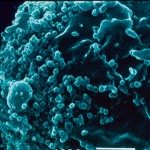Link to Pubmed [PMID] – 27267272
Retrovirology 2016 Jun;13(1):39
BACKGROUND: During the first trimester of pregnancy, HIV-1 in utero transmission is rare despite the permissivity of the placenta and the decidua (the uterine mucosa during pregnancy) to infection. In the decidua from the first trimester of pregnancy, macrophages (dMs) are the HIV-1 main target cells. Decidual natural killer (dNK) cells account for 70 % of decidual leukocytes. They display distinct phenotype and functions compared to peripheral NK cells. At the periphery, NK cells are involved in the control of HIV-1 infection. In this study, we investigate whether human decidual natural killer (dNK) cells control dM HIV-1 infection.
RESULTS: Autologous cocultures of infected dMs with dNK cells reveal that dNK cells strongly inhibit dM HIV-1 infection. The addition of dNK cells to dMs at different times after infection suggests that the control occurs before the complete establishment of the infection. Double chamber cocultures show that cellular contacts are necessary for an optimal control of infection. Nevertheless, soluble factors secreted by dMs and dNK cells in double chamber cocultures partially inhibit dM HIV-1 infection, indicating that soluble factors have also a role in the control of infection. IFN-γ secretion is increased in infected and uninfected cocultures. We show that IFN-γ is involved in the control of dM HIV-1 infection by dNK cells.
CONCLUSIONS: These results demonstrate that human dNK cells inhibit efficiently HIV-1 infection in dMs in vitro, and highlight the role of innate immune determinants in the control of HIV-1 transmission.

